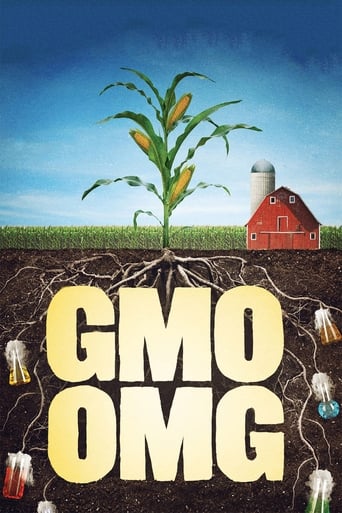

GMO OMG (2013)
Today in the United States, by the simple acts of feeding ourselves, we are unwittingly participating in the largest experiment ever conducted on human beings. Each of us unknowingly consumes genetically engineered food on a daily basis. The risks and effects to our health and the environment are largely unknown. Yet more and more studies are being conducted around the world, which only provide even more reason for concern. We are the oblivious guinea pigs for wide-scale experimentation of modern biotechnology. GMO OMG tells the story of a fathers discovery of GMOs in relationship to his 3 young children and the world around him. We still have time to heal the planet, feed the world, and live sustainably. But we have to start now!
Watch Trailer
Cast


Reviews
Obviously, this documentary uses emotions and children too much, and therefore it is not a masterpiece. But still, I must laugh over these super negative and personal reviews here. Are these people paid by Monsanto etc., or brainwashed by these companies already?Monsanto, as any other corporate company, do not care about people, environment or the future of humans and nature. We have created the system when companies care only, but only, about own profit and never-ending profit growth for its shareholders. GMO itself does not have to be bad, but our capitalism without regulations and limits allows to exploit it in the worst possible way, killing nature and even people. Ask about BT cotton in underdeveloped countries as well, pretty interesting things are happening there!
This documentary is god awful. Don't be fooled by the quaint indie score or the silly smiles the narrator makes in the film. This documentary is completely full of lies that half an hour of research can easily disprove.Let me first make clear that despite the film's claim that there are 0 peer reviewed there are over 2000 that show that either GMOs are no more harmful than organic crops or are even better. His Haiti stuff is such a disgusting desperate attempt at an emotional appeal. You're dealing with a populace that has no idea about the science of GMOs and the leader of the movement claims that there are health harms and severe economic and environmental harms. The only one of those claims that is remotely true is environmental harms, which is part of his decrease in biodiversity claim and the increase in herbicides. Those claims are true, but biodiversity impact is extremely exaggerated and he doesn't understand the difference between herbicide and pesticide. Pesticides ARE in the seeds, but they have been Proved to be unharmful to humans.Next, I'd like to discuss his conflation of Monsanto and GMOs. While Monsanto is the biggest manufacturer of GMOs, they are not the same thing. Some of their business practices are controversial, namely their 1 harvest "terminator seeds" (there's a difference, Monsanto doesn't sell terminator seeds, but their patent makes farmers rebuy which is what they mean to refer to in the film). While the vast majority of farmers restock after every harvest anyway, I understand the concern. However, we must understand that the practices of GMO companies do not mean GMOs are bad, it means the company's practices are bed. On the topic of Monsanto, please take the time to research Monsanto lawsuits and you'll understand how stupid and ignorant his claims are. And the reason Monsanto spends so much to stop labeling is BS propaganda like this film. As he proved right after demonizing Monsanto for this, when people find out their eating GMOs they get scared even though they clearly are just finding out what GMO means. It's not that they know their products are bad, it's that people think they're bad despite the overwhelming evidence to the contrary.Lastly and perhaps the most bothersome part of this movie for me (above his gross Haiti and WWII appeal, his mangling of statistics, the conflation of issues, and just straight out lying) is the way he treats his children. The kids grow up being fed BS propaganda by their insane father. Whenever he leaves, they obviously enjoy the foods and again the health harms he claims will hurt the kids when their older have no scientific basis. He forces his kids to hold up the GMO signs and scares them into believing propaganda, which is so freaking disgusting to watch. It makes me sick.I have to leave you guys with a suggestion: DO SOME RESEARCH into this guys claims. I researched GMOs in depth for a year and it's horrible to watch this guy fooling so many people. Let it be know that I am extremely liberal meaning I identify with an ideology that largely takes the side of the narrator, but I'm a liberal, because I believe things that are factual. In the same way Gay Marriage has no credible evidence to support it leads to bestiality as many claim; in the same way there's no evidence to support that the war on drugs has stopped drug use at all; there's no evidence to support that GMOs are more harmful to your health than non-GMOs. Do research, I beg of you.
Jeremy Seifert's documentary GMO OMG has a strong approach to its subject matter, stringing along a thesis of a father's concern for the health and wellbeing of his two young children. Seifert explains his son's love for collecting seeds and his fascination that something so big and impacting on a person's life emerges from something so tiny. Seifert then states how he went on to learn about genetically- modified organisms (GMOs), which are manipulations to agriculture in order to increase the longevity and sustainability of crops. Immediately, he breaks down the information to two key types of GMOs, which are "pesticide producers" and "herbicide resistors." The former occurs when a crop is injected with a special chemical that allows it to produce a toxin to kill off invasive insects, while the former occurs when a crop is made immune to weed killer, allowing it to be entirely submerged in widely-distributed fertilizer and still remain unharmed.This prompts concern for Seifert as a father and, well, a consumer, as he begins to question the contents of everything he is eating. Because the presence and use of GMOs need not be labeled on food in America, it brings question as to whether or not the common phrase of "all natural" holds any leverage. On top of that, what are the effects of GMOs on the human body in the long run? If they are safe and harmless, what's the issue in labeling them? Have we all become involuntary participants in a large, global experiment at the expense of humongous seed corporations?Such questions are either directly or indirectly peddled by the documentary, and its big point of attack goes in the direction of Monsanto, one of the largest seed/chemical manufacturers in the world. Monsanto kickstarts a lot of farms and agriculture by forcing farmers to trade their natural seeds in order to use the exclusive Monsanto seeds. The company made headlines following the devastating earthquake in Haiti, when it sent over four-hundred tons of seeds to their community, gifting the seeds and allowing them to use them only if the country agreed to stop using their own natural seed. The Haitian community saw this as a backhanded attempt at kindness, as the natural seed holds immense importance in the country, and Monsanto's genetically-modified seed seemed far less attractive.Seifert persists on to show the impact of Monsanto, through colorful, legible graphs, along with batting off startling statistics. For one, eighty perfect of all processed foods contain GMOs, with eight-five and ninety-one percent of corn and soy being genetically-modified as well. About one-hundred and sixty-five acres in the United States contain genetically-modified crops with about four-hundred and twenty acres housing them all over the world. One of the most alarming things presented in the film is how farms with non-GMO crops are affected negatively by those bearing GMOs. When crops are injected with special chemicals, they shed or bear the chemicals, and when the wind blows, spread the chemicals to other locations. Non-GMO farms in close proximity with GMO farms are often affected by the latter's unintentional spread of chemicals, allowing tests for the quality of the crops to become skewed, which are then met with repercussions from Monsanto's legal team.Seifert presents all of this to us in a way that, while sometimes too hardened on statistical data, is digestible and easy to follow, especially given the fact that, judging to the beginning of the film, few know what GMOs are and where they can be found. Whether you support the use of genetically-modified organisms and see no harm in it, or find they're an abhorrent route for mankind to make an attempt to "play God," as Seifert bills it in the film, I don't see a harm in wanting to know the health effects of something found in an overwhelming majority of the foods we eat. This is part of the reason I enjoy Seifert's approach to the subject matter, as it forms a thoughtful outline and conversation.What I didn't enjoy, however, was Seifert's rapid descent into negativity over GMOs, which seemed to happen all too quickly. From the beginning, we see a concerned father wanting to get to the bottom of what's in his food. By the half hour mark, we can see Seifert has clearly taken the pathway to being against the use of GMOs, which is fine if the film had started out by taking that stance rather than trying to travel down the middle of the road. Once Seifert starts digging into the potential harms of GMOs, he never revisits or adheres to what one thought he would in the beginning of the film, which is a fair analysis of both sides. In an age where prolific fact-checking has made every documentary at least questionably authentic, GMO OMG would've benefited from an equal examination not only for intellectual purposes but for consistency purposes as well.Yet, it's sophomoric to dismiss GMO OMG has a film with no substance or thought-provoking questions whatsoever. Seifert gets almost philosophical and contemplative when he talks about the pervasive patenting and trademarking of seeds and wildlife that is occurring with big seed corporations like Monsanto, Du Point, and Syngenta, saying these companies are in a "race to own the building blocks of life." He questions the ethical behavior of corporations - in a way that's very popular right now - about their evasive ways to avoid questioning on the GMOs used in their products in a way that would lead any reasonable person to assume there is something to hide. The only detractor to GMO OMG is that Seifert picks a side far too easily and, in turn, compromises hope for a mostly-unbiased analysis.Directed by: Jeremy Seifert.
The concerning aspect of genetically modified organisms in food is examined in this surprisingly sweet documentary. Pesticides, herbicides and frankenfoods are unpleasant subjects, but this film softens the blow of bad news about what we eat by using the narrative thread of a father out to find answers about what's in the food he feeds his kids. It was news to me that countries as non-citizen-loving as Russia and China require labeling on GMO food products, while the US does not. With anti-Monsanto marches happening around the country, this film provides a good capsule of information about the GMO issue. The dry science is offset by a range of easy-on-the-eye locations such as Haiti, Norway and France.


